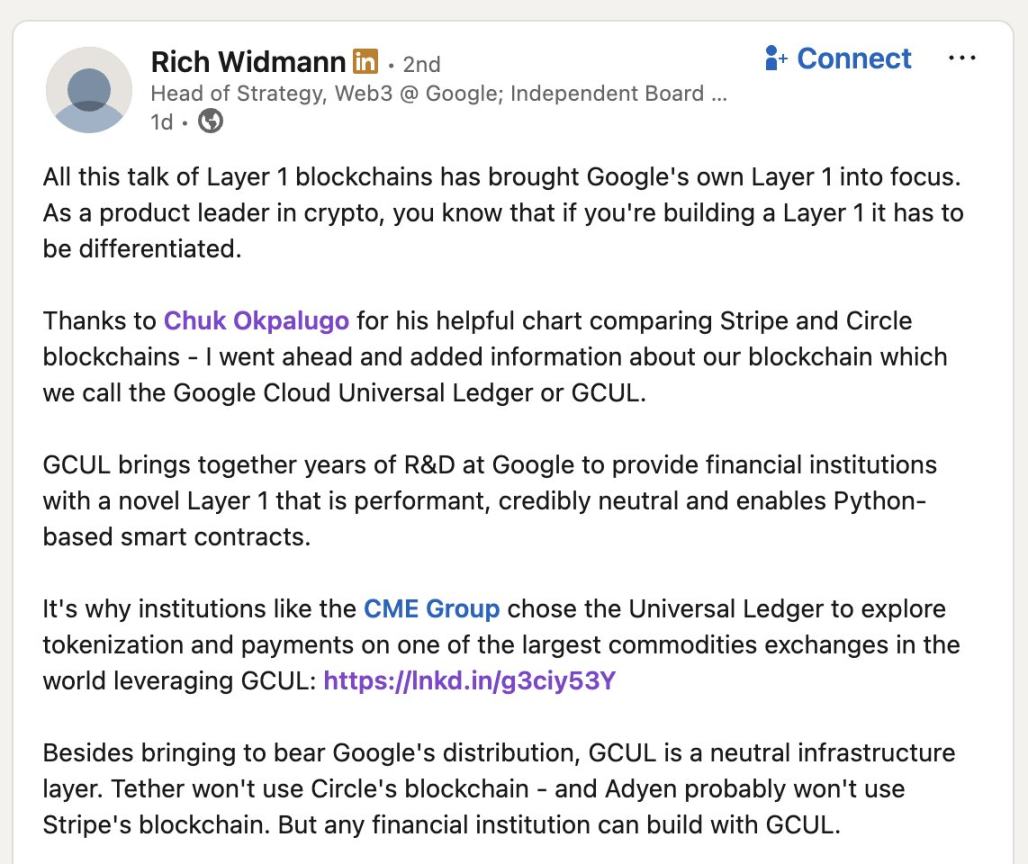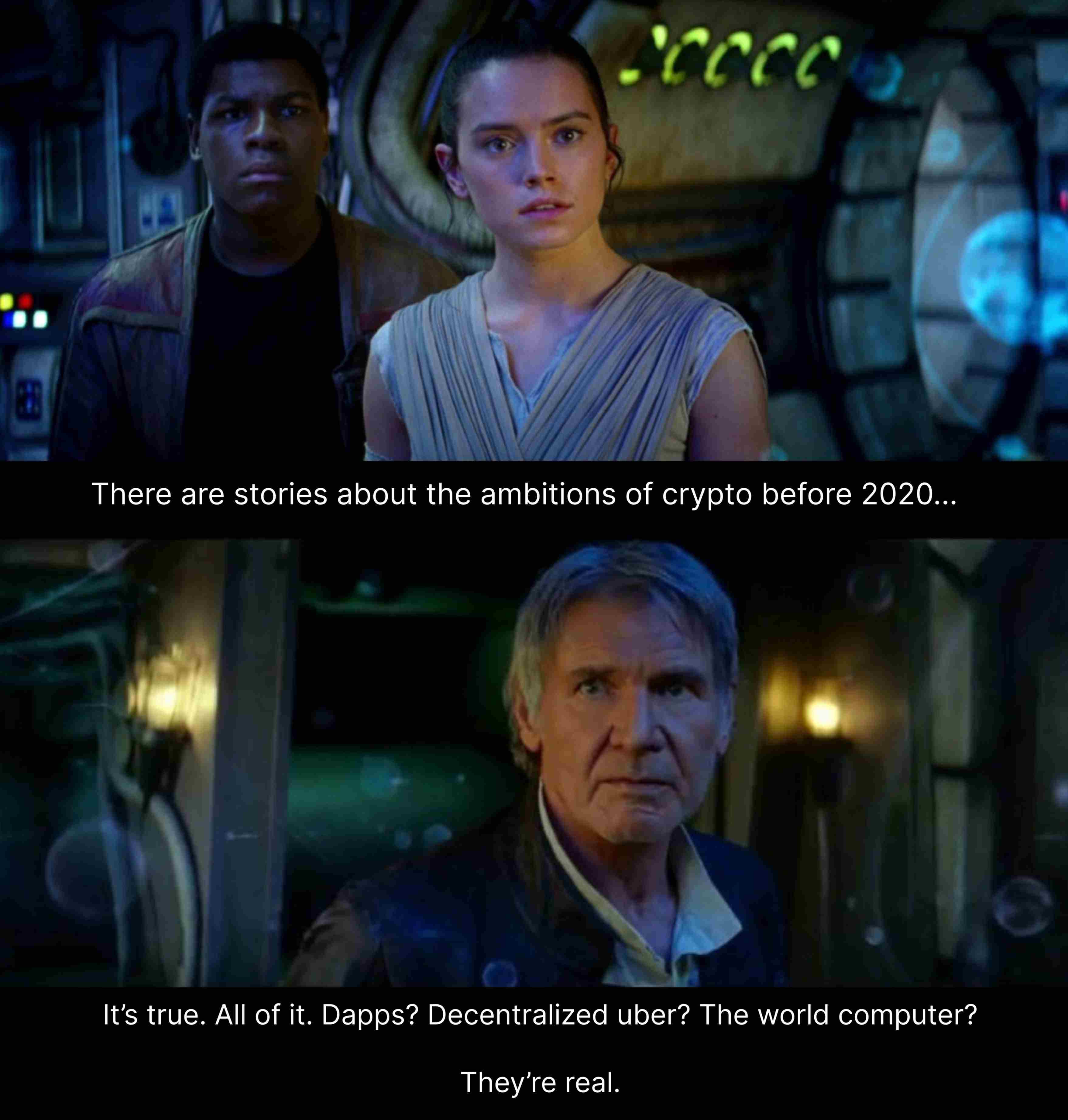This is not a revolution, but perhaps true adoption.
Written by: Jill, Chief Strategy Officer of Espresso
Translated by: Luffy, Foresight News
A user on cryptocurrency Twitter recently opened LinkedIn and stumbled upon a post from Google's Web3 head (wait, there’s such a position!?).
The post revealed some details about Google's Layer 1 blockchain product (wait — what?), leaving the entire industry puzzled.

Unlike others, I am not surprised that Google is working on a Layer 1 blockchain. Part of the reason is that I still remember the "frenzied years" from 2015 to 2020: from Microsoft, Alibaba to JPMorgan, LVMH, almost every major company launched its own blockchain.
To be honest, objectively speaking, most of the first batch of blockchain experiments from that era ended up in vain. These blockchains became "symbolic art installations" in corporate lobbies: clients and institutional investors could catch a glimpse of a shadow of "innovation" and feel a bit of "modernity," but that was it; don’t stop, don’t ask too many questions.
By 2018 or 2019, enterprise blockchains seemed to be fading away, but then Facebook emerged with the blockchain project Libra—oh, it was a full five years too early. Restricted by the Biden administration's regulatory policies and a cautious attitude towards cryptocurrencies, the project ultimately failed to launch. However, when Zuckerberg announced this plan in 2019, it ignited a new wave of FOMO, prompting tech companies from Silicon Valley to Seoul to follow suit, leading to another wave of enterprise blockchain projects.
The Dilemma of Innovation Labs
Now, it has been ten years since "blockchain" and "distributed ledger technology" first appeared in the memos and board meetings of Fortune 500 companies (yes, ten years!). Most of these projects have been stuck in the "purgatory of proof of concept," failing to enter actual production. Of course, there are a few successful cases (for example, Kakao's Layer 1 blockchain Kaia is worth mentioning), but overall, most projects have not made it out of the lab.
The "innovator's dilemma" refers to: when faced with disruptive technology, large established companies are often outpaced by more agile, unencumbered startups. The book proposing this concept was published in 1997, just before the internet bubble, and it suggested that large companies set up departments similar to startups (often called "innovation labs") to mitigate this risk.
Over the past decade, corporate executives have firmly believed that innovation labs could protect them from being disrupted. These labs have been busy "rebranding" public repositories of blockchain code, running code in test environments, while the output has mostly been press releases.
In recent years, many executives may have scrutinized this resource investment, torn between whether to continue "playing the innovator," pondering whether blockchain is just another tech bubble (just like the one that burst shortly after "The Innovator's Dilemma" became popular on CEO desks). Should they shut down the labs and admit failure? Or pause the experiments, leaving a few people to tinker quietly? Or double down and continue searching for innovations that can truly be applied to their business? This has become the dilemma of innovation labs.
Apple Chain
I don't know if Google's Layer 1 is a remnant of the previous innovation era or a brand new project; I also don't know if it is already online or still in development (though the LinkedIn post mentioned a "private testnet"). Aside from press releases from corporate partners like the CME Group, information about it is scarce. I actually know nothing about Google's blockchain business.
But I do know another tech giant is indeed running its own Layer 1 (let's loosely define "Layer 1," to be honest, it can only be this way in a corporate context) — Apple.
Apple has never announced a "blockchain innovation lab," has not released a Web3 strategy, nor has it issued any press releases. In fact, searching for "Apple Chain" mostly yields news about Apple removing blockchain-related apps from its App Store, rather than news about Apple's self-developed blockchain.
Yet, it has done just that.
The story is this: over the past few years, within the Apple Intelligence project, there has been a rather innovative highlight — "private cloud computing," which is a system designed for private AI processing. In related technical blogs, Apple mentioned providing a verifiable privacy and security assurance framework for security researchers: Apple "publishes the measurement data of all code running on the PCC to a transparent log that is append-only and cryptographically protected against tampering."
This sounds just like blockchain. It cannot be programmed, does not support your commonly used DeFi applications, and will not be used by large financial institutions for settlement innovation, but Apple's blockchain may just achieve that elusive "practicality" holy grail.
By the way: the core contributor to this Apple project, @cathieyun, has a background in blockchain protocol development. Is this surprising?
Realizing the Dream of Web3
If you've been in the crypto industry for a few years, you might remember the grand and beautiful dreams of the early days.

Before yield mining and "shilling" mining took off, before the airdrop craze and infrastructure boom emerged, there was only one dream: blockchain would become a "trust machine."
We would not adopt Web2 platform capitalism, but would embrace decentralized social media, decentralized sharing economies, and decentralized creator markets, which are owned by everyone and belong to no one;
We would no longer rely on the "fourth estate" of corporate media, but would determine and disseminate the truth through decentralized prediction markets and oracle services, using free market incentive systems;
We would have an open, verifiable global payment and transaction system, rather than centralized, opaque, and extractive financial companies.
To say that the industry has done well in these use cases would be an understatement. While we may not have reached the imagined future of chrome shining, lush green grass, and flying cars, all the aforementioned fields have tangible products, many of which have even reached mainstream users, perhaps signaling the onset of widespread adoption!

Most of these products have been developed by startups on public chains like Ethereum and Solana. Some startups (like Circle and Coinbase) have even grown into large companies.
Despite setbacks in mainstream acceptance and adoption, and despite many people grappling with a "lack of use cases," the industry is actually doing quite well. Moreover, I believe that although the industry is infamous for "criminals" (here we go again with SBF), it is easy to become cynical; but upon closer inspection, the dream of Web3 remains as grand and beautiful as it was initially.
I believe that the adoption of products like stablecoins, DEXs, and prediction markets on Ethereum will continue to grow; but I also think that the way blockchain is adopted is about to undergo a significant transformation. Unfortunately for dreamers, this transformation may be far from dreamy, but rather more pragmatic, resembling "Apple Chain."
Web2.5's "Boring" Practicality
It's time to mature. Idealists should embrace pragmatism. We must accept: the "trust machine" we built is, in fact, just a ledger, a distributed database, middleware.
To be clear: I think this is great. It benefits the industry and is the best opportunity for the true innovations of the past decade to achieve scalable impact. It is through this approach that the processes governing the flow of global assets and data will be transformed, and the technology we create will change lives.
Unlike past corporate experiments, I believe the moment for enterprise blockchain has arrived. They will become the main channel for pushing this technology to the world. This is happening not only because the regulatory environment is loosening but also because the technology, use cases, and related talent have matured enough for blockchain to be put into actual production.
But I dare say that the large-scale adoption of blockchain by enterprises will not look like what innovation labs envisioned, nor will it resemble the boasting of the Enterprise Ethereum Alliance in 2017. I also don't think enterprises will position blockchain as "neutral infrastructure." Just look at what @gwartygwart has to say:
"The funniest part is that 'Tether won't use Circle's blockchain' makes Google seem like a neutral arbiter. Remember, this company once rigged its own ad auctions to screw over merchants, and now it's the only hope for 'ensuring fairness.'"
Listen to @ethereumJoseph, who has been fighting on the front lines for a long time:
"Permissioned enterprise chains were tried years ago and failed. Why? Because no one trusts the central controllers of these chains enough to want to settle on them. The 'delisting' drama has played out repeatedly for decades."
Indeed, enterprise blockchains are unlikely to be the completely open, permissionless systems that dogmatists demand. So, unsurprisingly, they are also unlikely to be used to protect civil liberties or empower dissenters as crypto-punks hope.
I guess Apple's use of a "cryptographically protected append-only transparent log" to prove its commitment to security researchers is probably the most "crypto-punk" way enterprises will apply this technology.
On the contrary, the development and adoption of blockchain by enterprises will only be due to its "practicality," solving the only problem that matters to them: increasing profits. This is Web2.5.
Several fields have already shown this trend:
Robinhood is leveraging tokenization as a financial engineering tool to push U.S. stocks to European retail investors. When Vlad Tenev talks about this, he makes it sound grand and appealing to us dreamers, but make no mistake: this is more like replacing backend databases with blockchain (while doing a bit of geographical arbitrage), far from Satoshi's vision. Things should be this way.
Stripe is acquiring and developing stablecoin technology (including its own blockchain!), likely aiming for lower costs in global distribution than existing systems. Corporate motives and corporate technology can bring about significant impact and distribution. I accept this approach.
I believe enterprises will adopt blockchain for these goals:
Enterprise blockchains can serve as payment infrastructure, specifically tailored for AI agents, which existing financial rails cannot achieve;
In the "post-truth era" where deepfakes are rampant, using hash-linked data to create verifiable timestamps for images and videos in a tamper-proof append-only ledger is a good method for enterprises;
As @diogomonica said, publicly traded companies' Layer 1 may become the new standard for developer platforms, allowing enterprises to create an open ecosystem composed of composable applications.
For these reasons, it makes complete sense for Google to develop a blockchain platform. Even more reasonable is that this is led by Google Cloud, as it already deals with foundational, transformative, yet somewhat underlying technologies. Ultimately, these blockchains are just that.
This is not a revolution, but perhaps true adoption. To the new corporate "dominators" of the crypto industry, I say: welcome.
免责声明:本文章仅代表作者个人观点,不代表本平台的立场和观点。本文章仅供信息分享,不构成对任何人的任何投资建议。用户与作者之间的任何争议,与本平台无关。如网页中刊载的文章或图片涉及侵权,请提供相关的权利证明和身份证明发送邮件到support@aicoin.com,本平台相关工作人员将会进行核查。




